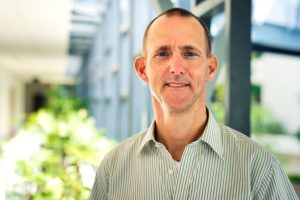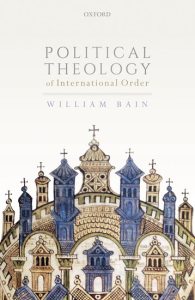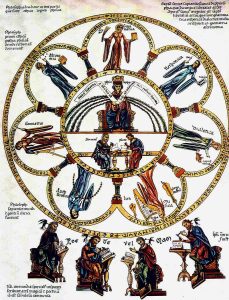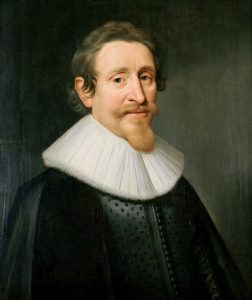Featuring A Success Story (FASS) – HSS Faculty Research Fellowship (HSS FRF)
March 3, 2022
The HSS Faculty Research Fellowship (HSS FRF) provides release from teaching and administrative duties for one semester. The award may be held in either semester one or two, for work in Singapore or overseas. The fellowship is open to full-time NUS faculty members on tenure track. Preference will be given to junior and mid-career scholars with heavy teaching loads and who propose to complete book manuscripts or large-scale field work. The annual call for applications closes on 1 March 2022. Learn more about the fellowship here.
 Professor William Bain (NUS Department of Political Science) recently spoke to us about his fellowship undertaken in 2017 and how it helped him pursue his research goals of completing his book manuscript and several related journal articles and book chapters. Prof Bain’s book, Political Theology of International Order (2020, OUP), posits that constitutive traditions of international political thought, particularly realism and liberalism, are rooted in unacknowledged Christian presuppositions. It illustrates how these ideas migrated from theology to ethics, law, and politics. This migration shapes conceptualization of anarchy, balance of power, international law, global constitutionalism, and international community.
Professor William Bain (NUS Department of Political Science) recently spoke to us about his fellowship undertaken in 2017 and how it helped him pursue his research goals of completing his book manuscript and several related journal articles and book chapters. Prof Bain’s book, Political Theology of International Order (2020, OUP), posits that constitutive traditions of international political thought, particularly realism and liberalism, are rooted in unacknowledged Christian presuppositions. It illustrates how these ideas migrated from theology to ethics, law, and politics. This migration shapes conceptualization of anarchy, balance of power, international law, global constitutionalism, and international community.
Why did you decide to apply for a HSS Faculty Research Fellowship rather than another type of grant (e.g. Book Grant, Tier 1 etc.)?
 The HSS Faculty Research Fellowship was particularly well suited to support my research objectives at the time. As a textualist, the most important research commodity is time, and the HSS Fellowship granted me the time to work on a book manuscript that was the capstone of a multi-year project on the theological foundations of modern international order. A one semester fellowship was exactly what I needed to achieve that goal. I did not consider a Tier 1 grant because, again, I needed time rather than money to achieve my goals. The HSS Fellowship allowed me seven clear months of writing time (if the summer break is added to the fellowship itself). In the end, I was able to complete the draft of my book, after which I submitted it to two university presses for review: Cambridge and Oxford.
The HSS Faculty Research Fellowship was particularly well suited to support my research objectives at the time. As a textualist, the most important research commodity is time, and the HSS Fellowship granted me the time to work on a book manuscript that was the capstone of a multi-year project on the theological foundations of modern international order. A one semester fellowship was exactly what I needed to achieve that goal. I did not consider a Tier 1 grant because, again, I needed time rather than money to achieve my goals. The HSS Fellowship allowed me seven clear months of writing time (if the summer break is added to the fellowship itself). In the end, I was able to complete the draft of my book, after which I submitted it to two university presses for review: Cambridge and Oxford.
What do you think were the strengths of your fellowship application that led to it being funded?
In my judgement, two strengths stand out. First, the project had progressed far enough that I could provide a compelling (and concise) statement of its objectives and, crucially, its scholarly significance. The project offered a radical re-reading of a master concept in international thought, the idea of international order. The scope and ambition of the project is consistent with what I understand to be the purpose of the HSS Fellowship and it contributes to NUS’ broader mission as a global research university. Second, my application articulated realistic goals given the timeframe of the fellowship. In my opinion, a good proposal is one that is sufficiently ambitious but which is also ‘doable.’ Applications that promise too much are likely to lack credibility with the selection committee. Thus, I was careful to strike an appropriate balance between these considerations.
Did you face any challenges carrying out the fellowship? If so, what did you do to overcome those challenges?
 Fortunately, I did not encounter any challenges, if only because I learned from mistakes earlier in my career. A fellowship of this type is intended for a specific project and it is vital to stay on task. Having no teaching for a semester presents the temptation of taking on new commitments in the mistaken belief there is time to fulfil them. This is not the time to take on an edited book chapter or to write a conference paper that is not directly related to the fellowship project. My approach was to reduce commitments; I declined more than one invitation to contribute to edited books as well as invitations to serve as a journal referee. Doing so allowed me to focus exclusively on completing my book manuscript.
Fortunately, I did not encounter any challenges, if only because I learned from mistakes earlier in my career. A fellowship of this type is intended for a specific project and it is vital to stay on task. Having no teaching for a semester presents the temptation of taking on new commitments in the mistaken belief there is time to fulfil them. This is not the time to take on an edited book chapter or to write a conference paper that is not directly related to the fellowship project. My approach was to reduce commitments; I declined more than one invitation to contribute to edited books as well as invitations to serve as a journal referee. Doing so allowed me to focus exclusively on completing my book manuscript.
What do you think the HSS Faculty Research Fellowship enabled you to achieve that you would not have been able to do without it?
 In addition to being able to complete my book manuscript, the HSS Fellowship opened the door to professional interactions that advanced my research and increased my international visibility. One of my book chapters focussed on the seventeenth century Dutch thinker Hugo Grotius, and I took the opportunity during my fellowship to travel to Budapest to attend a specialist workshop hosted by the Grotiana Foundation. Had I been teaching I would not have been able to attend. Not only did I receive valuable feedback on my chapter from leading Grotius scholars, the positive response to my work led to an invitation to contribute to The Cambridge Companion to Grotius, which is a part of a flagship series published by Cambridge University Press. It was all quite fortuitous in the end; with the end of my fellowship and while my manuscript was under review (see the previous point!), I wrote the chapter and it is now a part of a volume that includes many of the world’s finest Grotius scholars.
In addition to being able to complete my book manuscript, the HSS Fellowship opened the door to professional interactions that advanced my research and increased my international visibility. One of my book chapters focussed on the seventeenth century Dutch thinker Hugo Grotius, and I took the opportunity during my fellowship to travel to Budapest to attend a specialist workshop hosted by the Grotiana Foundation. Had I been teaching I would not have been able to attend. Not only did I receive valuable feedback on my chapter from leading Grotius scholars, the positive response to my work led to an invitation to contribute to The Cambridge Companion to Grotius, which is a part of a flagship series published by Cambridge University Press. It was all quite fortuitous in the end; with the end of my fellowship and while my manuscript was under review (see the previous point!), I wrote the chapter and it is now a part of a volume that includes many of the world’s finest Grotius scholars.
What do you think you would have done differently if you could start all over again?
I am happy (and relieved) to say that I would not do anything differently. This is due to learning from past mistakes, as previously mentioned. I certainly have benefited from receiving good advice from senior colleagues in this regard, and I would encourage junior colleagues especially to solicit advice before embarking on a fellowship to ensure their fellowship is as rewarding as possible.
Thank you very much for sharing your experiences with the HSS Fellowship, Will! We wish you the best in your current and future research projects!
For more HSS Fellowship Success Stories, check out the following:
For Tier 1 Success Stories, check out the following:
- Associate Professor Jinping Wang’s “A Cultural History of Quanzhen Daoism in Thirteenth-Century North China”
- Assistant Professor Alex Mitchell’s “Exploring ‘Literary’ Devices for Poetic Interactivity” and “Understanding Repeat Engagement with Dynamically Changing Computational Media”
- Assistant Professor Juwon Seo’s “Randomization Tests of Copula Symmetry” and related papers
Stay tuned for forthcoming features on FASS Book Grant Awardees!

